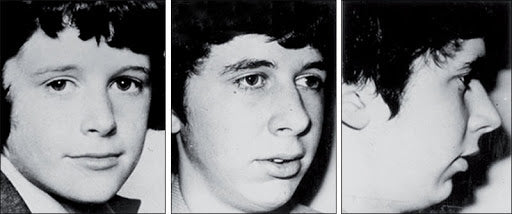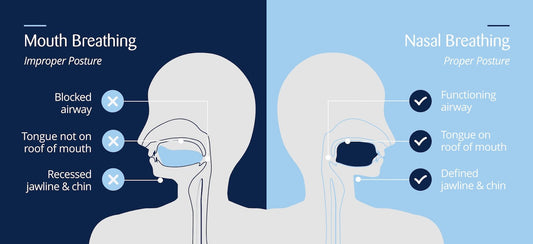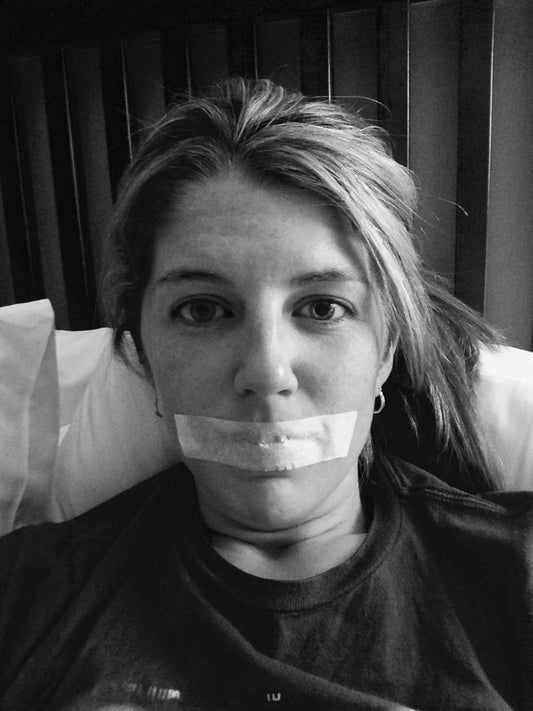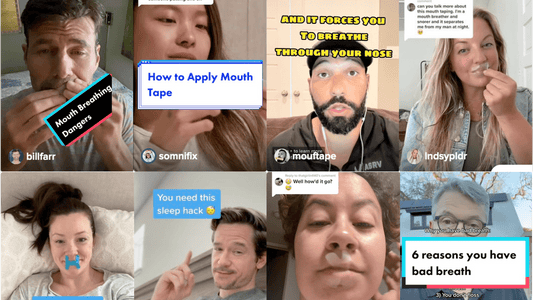You may have heard about mouth taping as an unusual sleep hack. But sealing your lips offers legitimate advantages for your sleep, health, and wellbeing.
Read on to learn the science behind five compelling benefits of mouth taping.
Quickly.. What is mouth taping?
For those of you that are new, mouth taping refers to placing a piece of tape over the lips before sleep to prevent the mouth from falling open during the night. This simple technique trains you to breathe through your nose instead of your mouth while sleeping.
Let’s explore some of the ways this can improve your sleep and health.
Benefit 1: Improved Sleep Quality
Studies show mouth taping leads to better sleep quality and less sleep interruptions. One randomized controlled trial published in the Journal of Clinical Sleep Medicine found that nasal breathing with mouth tape reduced nightly awakenings by 47% and increased time spent in deep sleep compared to controls.
Researchers speculate that mouth taping enhances sleep by increasing oxygen circulation during the night to keep the brain and body properly oxygenated. Breathing through the nose also provides natural resistance that regulates carbon dioxide levels, which influences sleep cycle regulation.
Benefit 2: Reduced Snoring
If you or your partner deal with bothersome snoring, mouth taping can help quiet things down. Snoring often occurs when throat tissues vibrate due to airway obstruction from the tongue and soft palate. Breathing through the mouth exacerbates this.
Keeping the lips sealed encourages nasal breathing which decreases tissue vibration and keeps airways open. In the same research mentioned above, loud snoring episodes (measured by the snoring index) decreased by 47% with mouth taping.
The technique can benefit both snorers and their sleep partners.
Benefit 3: Prevention of Dry Mouth
Do you wake up with an annoyingly dry mouth or throat? Mouth breathing overnight leads to parched oral tissues by morning. Mouth breathers experience significantly more occurrences of dry mouth versus nasal breathers.
Taping the mouth closed prevents escape of moisture and preserves saliva production. This reduces symptoms of cotton mouth and sore throat upon waking. Maintaining proper oral and throat moisture also lowers bacteria buildup and bad breath.
Benefit 4: Potential Reduction in Sleep Apnea Symptoms
Research shows mouth taping alleviates mild to moderate sleep apnea in certain individuals by promoting nasal breathing. In one study, the average number of apnea and hypopnea episodes per hour (called the AHI) decreased by 47% with mouth taping. Positional sleep apnea (worst on the back) saw apnea episodes decrease by 59% while sleeping on the back with mouth taping.
More research is needed and mouthtaping should not be seen as a cure for moderate to severe sleep apnea which often requires use of CPAP machines or oral appliances. But mouthtaping also serves as a great supplementary tool for those using CPAP machines.
Benefit 5: Improved Oral Health & Facial Structure
The dry mouth caused by nighttime mouth breathing contributes to many oral health problems. Lack of saliva allows cavity-causing bacteria to thrive. It also increases mouth acidity which erodes tooth enamel.
By preventing a parched mouth, taping can lower plaque buildup and dental decay risk. One study found fewer decayed dental surfaces in chronic mouth tapers who started nasal breathing. Promoting nasal breathing through mouth taping benefits both dental health and respiratory function.
Ready to Reap the Rewards?
As you can see, simple mouth taping at night offers advantages for improved breathing, reduced snoring, better sleep quality, oral health, and more. The unusual technique is backed by solid scientific evidence.
Looking for less interrupted slumber and better breathing? Try implementing mouth taping into your bedtime routine. With routine use, you’ll be reaping the rewards of restful overnight nasal breathing.




